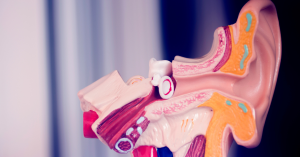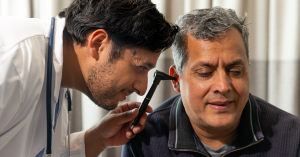Imagine waking up and suddenly being unable to hear out of one ear. There’s no warning, no pain—just a strange, unsettling silence. For many, this is the shocking reality of sudden hearing loss, a medical emergency that catches people completely off guard. Unlike gradual hearing loss that develops over time, sudden hearing loss—also known as sudden sensorineural hearing loss (SSHL)—can happen in an instant, often within hours.
Sudden hearing loss is not just inconvenient; it can be frightening and disorienting, especially if you’re unsure of what to do next. Many people make the mistake of thinking it will go away on its own or try to self-treat with over-the-counter remedies. But when it comes to this type of hearing issue, time is of the essence. Acting quickly can mean the difference between full recovery and permanent damage.
In this guide, we’ll walk you through what sudden hearing loss is, how to recognize it, and—most importantly—what to do immediately if it happens to you or someone you love. Whether you’re over 50, caring for an aging parent, or simply want to be informed, this article is your step-by-step resource for handling sudden hearing loss the right way.
Recognizing Sudden Hearing Loss: Key Symptoms and Red Flags
Sudden hearing loss (SHL) can feel alarming—but in the early moments, it’s often mistaken for something minor, like earwax buildup or fluid in the ear. Recognizing the difference is crucial. SHL typically affects one ear and occurs either instantly or over the span of a few hours to three days. The sooner you can identify the signs, the better your chances of effective treatment.
One of the most telling symptoms is a sudden drop in your ability to hear clearly in one ear. It might feel like your ear is “plugged” or like you’re underwater. Some people describe it as a muffled sensation, while others report a distinct “pop” sound right before their hearing disappears. If this happens and doesn’t resolve quickly, it’s a major red flag.
Other symptoms that may accompany sudden hearing loss include:
- Tinnitus: A persistent ringing, buzzing, or hissing sound in the affected ear
- Vertigo: A spinning or dizzy sensation that can make balance difficult
- Fullness or pressure: A sensation of congestion without any relief from yawning or swallowing
- Difficulty understanding speech: Especially in noisy environments, where sound seems distorted or unclear
It’s important to note that sudden hearing loss is not typically painful. That’s one reason people delay seeking care—they assume pain must accompany a serious issue. But SHL often arrives quietly, without physical discomfort, and can be easy to dismiss in the early hours.
If you experience any of these symptoms, particularly if your hearing drops significantly without an obvious cause (like noise trauma or an ear infection), seek medical attention immediately. The sooner a hearing professional can evaluate you, the greater your chances of a full or partial recovery.
Remember: Sudden hearing loss is a medical emergency. Don’t wait to see if it goes away on its own.
Common Causes of Sudden Hearing Loss
While the onset of sudden hearing loss (SHL) can feel like it comes out of nowhere, there are several underlying conditions and triggers that can contribute to this alarming experience. However, in nearly half of all cases, no definitive cause is ever found—a condition referred to as idiopathic sudden sensorineural hearing loss. Still, understanding the known potential causes can help you and your healthcare provider take the right steps toward diagnosis and treatment.
Viral Infections
Viruses are one of the most frequently suspected culprits. Certain infections—such as those caused by herpes simplex, influenza, measles, or mumps—can inflame the inner ear or the auditory nerve, disrupting how sound is transmitted to the brain. These viral attacks often cause no other noticeable symptoms, which is why SHL might be the first (and only) sign.
Circulatory Issues
The inner ear relies on a delicate network of blood vessels for oxygen and nutrients. If blood flow is reduced or interrupted—due to a clot, vascular spasm, or other circulatory disturbance—the ear can suffer sudden, irreversible damage. Individuals with underlying heart disease, high blood pressure, or diabetes may be at higher risk.
Autoimmune Disorders
In some cases, the body’s immune system mistakenly attacks its own tissues, including those in the inner ear. Conditions such as autoimmune inner ear disease (AIED) or lupus can cause rapid and recurring hearing loss. This type is often accompanied by fluctuations in hearing or episodes of improvement and relapse.
Head Trauma or Acoustic Injury
Sudden hearing loss can also result from a physical injury to the head or a direct blow to the ear. Loud noise exposure—like a sudden explosion or gunshot—can rupture inner ear structures or damage the auditory nerve, leading to immediate hearing loss.
Ototoxic Medications and Neurological Conditions
Some medications, especially certain antibiotics, chemotherapy drugs, and diuretics, are known to be ototoxic—meaning they can damage the ear’s hearing structures. Rarely, neurological issues like multiple sclerosis or tumors such as an acoustic neuroma can present with sudden hearing loss as a symptom.
Even though the list of possible causes is broad, it’s important not to self-diagnose. Immediate testing by a medical professional can help rule out serious underlying conditions and determine whether steroid treatment could be effective. In the next section, we’ll cover exactly what to do within the first 24–48 hours to maximize your chance of recovery.
What to Do Immediately: Steps to Take in the First 24–48 Hours
When sudden hearing loss strikes, every minute counts. The first 24 to 48 hours are absolutely critical for improving your chances of recovery. Acting fast and seeking the right medical attention can often mean the difference between regaining your hearing and facing permanent loss. Here’s exactly what you should do if you or someone you know experiences sudden hearing loss.
Don’t Wait—Seek Medical Attention Immediately
It may be tempting to wait and see if your hearing returns on its own, especially if there’s no pain. But this is one of the most dangerous responses. Sudden hearing loss is considered a medical emergency, and delaying treatment can lead to worse outcomes. If it’s after hours or your primary care provider isn’t available, go to an urgent care center or emergency department and ask for an ENT (ear, nose, and throat) referral immediately.
Avoid Self-Treatment
Many people initially think their ear is simply blocked with wax or fluid and attempt to “fix” it using cotton swabs, ear candles, decongestants, or even home remedies. These can do more harm than good. Until you’ve had a proper evaluation, do not put anything in your ear or attempt to clean it out yourself.
Get a Hearing Test (Audiogram)
The first step a hearing specialist will take is to perform an audiogram—a test that measures how well you hear different frequencies. This helps determine whether the hearing loss is sensorineural (related to the inner ear or nerve pathways) or conductive (caused by blockages like wax or fluid). Sudden hearing loss almost always involves sensorineural damage, which requires immediate treatment.
Start Steroid Treatment as Soon as Possible
If sensorineural hearing loss is confirmed, doctors will often begin steroid therapy without delay. Steroids reduce inflammation and swelling in the inner ear, giving you the best chance at recovering lost hearing. These can be administered orally or through direct injections into the ear (intratympanic steroids), depending on your condition and doctor’s recommendation.
Insist on Further Testing if Necessary
If your symptoms don’t improve quickly, or if your provider suspects an underlying condition, further tests such as an MRI may be ordered to rule out more serious causes like tumors or neurological disorders. While not always necessary in the first 24 hours, it’s important to be persistent if symptoms don’t resolve or if you’re unsure about the diagnosis.
Document Your Symptoms
Take note of exactly when your hearing loss started, what it felt like, and whether you had any other symptoms (like dizziness or tinnitus). This information can be helpful in identifying possible causes and in guiding treatment decisions.
Time is a vital factor in treating sudden hearing loss. Studies show that people who begin treatment within 48 hours have significantly better recovery outcomes than those who delay. So if something feels off with your hearing—act fast, trust your instincts, and get professional help.
Diagnosis and Treatment Options: What to Expect from Your Doctor
Once you seek medical attention for sudden hearing loss, the diagnostic and treatment process begins promptly. This stage is critical—not just for confirming the type of hearing loss, but also for ruling out more serious conditions and ensuring that you receive the right therapy as quickly as possible.
Hearing Evaluation: The Audiogram
Your doctor or audiologist will first conduct a detailed hearing test called an audiogram. This measures how well you hear tones at different frequencies and volumes. Sudden hearing loss is typically classified as sensorineural, which involves the inner ear or auditory nerve, rather than the outer or middle ear. An audiogram helps confirm this and establishes the severity and pattern of hearing loss.
In many cases, people with SHL experience a 30-decibel or greater loss over at least three contiguous frequencies—a benchmark often used to define sudden sensorineural hearing loss (SSNHL).
Physical Examination and Medical History
An ENT specialist will also conduct a physical exam of your ears and ask about your medical history, recent illnesses, medications, and lifestyle. This helps determine if a specific trigger—like a viral infection or ototoxic medication—might be the cause.
If your hearing test points to SSNHL and no obvious physical obstruction is found, you’ll likely move to more advanced testing.
Imaging Tests (If Needed)
To rule out rare but serious conditions like an acoustic neuroma (a benign tumor on the auditory nerve), your doctor may order an MRI scan. While not always necessary right away, imaging is especially important if your hearing loss is accompanied by persistent dizziness, neurological symptoms, or fails to improve after initial treatment.
Steroid Therapy: The Primary Treatment
The gold standard for treating sudden sensorineural hearing loss is steroid therapy. Steroids reduce inflammation in the cochlea and auditory nerve, giving you the best shot at recovering hearing. These can be administered in two main ways:
- Oral Steroids: Often prescribed as a high-dose tapering course over a week or more.
- Intratympanic Steroid Injections: Steroids are injected directly into the middle ear to reach the inner ear more effectively, especially when oral treatment isn’t an option or has failed.
Studies show that patients treated within 7 to 10 days have the highest chance of regaining their hearing, though results vary depending on severity and other health factors.
Monitoring and Follow-Up
Your provider will likely schedule follow-up hearing tests over the coming weeks to monitor your progress. In some cases, hearing gradually improves, while others may see little or no change. If no recovery is seen after several weeks, discussions about long-term options (like hearing aids or cochlear implants) may begin.
Getting a diagnosis of sudden hearing loss can be overwhelming, but remember—you’re not alone. Early action, combined with the right medical guidance, significantly improves your odds of recovery.
Coping with the Aftermath: When Hearing Doesn’t Return
While many people experience partial or full recovery from sudden hearing loss, others face the difficult reality of permanent hearing damage. If your hearing doesn’t return after treatment, you’re not alone—and there are still many effective ways to adapt, manage, and maintain a high quality of life.
Emotional and Psychological Impact
The emotional toll of losing your hearing, especially without warning, can be significant. People often report feelings of frustration, anxiety, isolation, and even grief. Communication becomes harder, especially in group settings or noisy environments, and social withdrawal can occur.
It’s important to acknowledge these feelings and seek support. Talking with a therapist, joining a hearing loss support group, or connecting with others who’ve had similar experiences can help you process the changes and find new ways to engage with the world.
Hearing Aids and Assistive Devices
For many, hearing aids offer a powerful solution. Even in cases of profound hearing loss in one ear, certain hearing aid technologies—like CROS (Contralateral Routing of Signal) systems—can transmit sound from the impaired ear to the better-hearing ear, improving your spatial awareness and communication abilities.
Other assistive listening devices, such as personal amplifiers, FM systems, and captioned telephones, can enhance daily living. These tools are increasingly user-friendly and compatible with smartphones, televisions, and public venues.
Cochlear Implants
In cases where hearing aids don’t provide sufficient benefit, cochlear implants may be recommended. These surgically implanted devices bypass damaged inner ear structures and directly stimulate the auditory nerve. Cochlear implants are not just for those born with hearing loss—they’re increasingly used in adults who have lost hearing suddenly or progressively.
Learning New Communication Strategies
Living with permanent hearing loss often requires adjustments in how you communicate. Here are a few tips that can make a big difference:
- Face people directly when speaking
- Reduce background noise when possible
- Ask people to speak clearly (not necessarily louder)
- Use visual cues and gestures
- Don’t hesitate to tell others about your hearing challenges
Maintaining Your Overall Wellbeing
Lastly, protecting your remaining hearing and maintaining good overall health becomes even more important. This includes regular hearing check-ups, avoiding loud noises, managing chronic conditions like diabetes or high blood pressure, and staying informed about new treatment options.
Permanent hearing loss may feel like a door has closed, but many people go on to live full, rich lives with the help of modern technology, medical support, and community connection. It’s not just about what you’ve lost—it’s about what you can still gain.
Conclusion
Sudden hearing loss is more than just a surprising inconvenience—it’s a medical emergency that demands immediate attention. While it may come without pain or warning, the risks of delaying treatment are serious and potentially permanent. The good news? Acting fast can make all the difference.
If you or someone you know experiences a sudden drop in hearing, especially in one ear, don’t wait to see if it gets better. Get evaluated by a medical professional—preferably an ENT—within 24 to 48 hours. A timely diagnosis, proper testing, and early steroid treatment offer the best chance for hearing recovery.
And if the hearing loss doesn’t resolve, remember: you still have options. From hearing aids and cochlear implants to assistive technologies and support networks, many tools and resources can help you adapt and thrive.
Knowledge is power, and knowing what to do in those first crucial hours can protect your hearing—and your quality of life—for years to come. So be informed, stay alert to the signs, and don’t hesitate to seek help. Your ears—and your future self—will thank you.
FAQ
What qualifies as sudden hearing loss?
Sudden hearing loss is typically defined as a rapid loss of hearing (30 decibels or more) over three or more connected frequencies, occurring within a period of 72 hours or less. It often affects one ear and can happen instantly or over a couple of days.
Is sudden hearing loss reversible?
Yes, in many cases, especially when treated early, hearing can return partially or completely. However, the chances of recovery decrease significantly if treatment is delayed beyond 10–14 days. Early steroid therapy is the most effective known treatment.
What should I avoid if I experience sudden hearing loss?
Avoid inserting anything into the affected ear, such as cotton swabs or liquids. Don’t try to self-treat with decongestants or ear drops unless advised by a doctor. Avoid loud noises and strenuous activities until you’ve been evaluated by a medical professional.
Why is sudden hearing loss more common in one ear?
While researchers aren’t entirely sure why, most cases of sudden hearing loss affect only one ear. It’s thought that vascular, viral, or autoimmune causes may impact one ear’s delicate structures more than the other. Bilateral cases are rare but do occur.
Can stress cause sudden hearing loss?
Stress alone is unlikely to be the sole cause, but it can exacerbate underlying conditions that may contribute to sudden hearing loss, such as blood circulation issues. Managing stress and maintaining overall health can help reduce your risk.
This article is for informational purposes only and is not a substitute for professional medical advice, diagnosis, or treatment. If you are concerned about your hearing or ear health, please consult a qualified healthcare provider.






